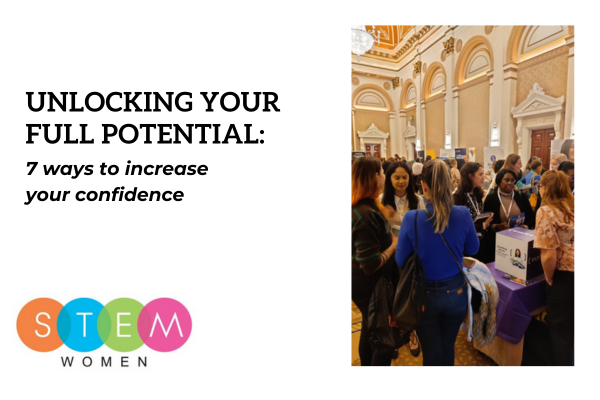“I have this constant self-doubt; knowing that I have done my best, still I feel I’m not enough.”
This quote is from an attendee at one of STEM Women’s recent networking and recruitment events – but it could really be from any of us. We often look at others who seem to exude confidence and feel that they have a secret ingredient to success, but the truth is that almost everyone feels self-doubt to some extent.
There are lots of factors which can affect confidence; Some of them are societal – from the ongoing impact of the pandemic on mental health, to social media, to the cost-of-living crisis – and some come down to the individual who may be more prone to anxiety, or simply less used to presenting themselves with confidence. We can also feel lower levels of confidence when we feel different, or that we don’t belong – this particularly affects those from minority groups and those who are underrepresented in certain fields, such as women and non-binary people in Science, Technology, Engineering and Mathematics (STEM) industries.
This feeling of not belonging, or not being good enough, is sometimes described ‘Imposter Syndrome’. This concept was first identified in the 1970s by two psychologists and is defined as ‘a collection of feelings of inadequacy that persist despite evident success’. Does this sound familiar? Our research has shown increasing numbers of students and recent graduates identify with this concept, but again, it’s not something that solely affects those starting out in their careers, as research from KPMG has shown that up to 75% of executives have experienced Imposter Syndrome too. It’s something we often hear from the employers who speak at our events – but we also hear employers mention confidence as the number one critical skill they’re looking for in new hires.
So how can we grow in confidence? How do some people appear more confident that others? Here are a few tips and ideas to help:
- Embrace your unique qualities: Each one of us possesses distinct talents, strengths, and interests that make us special. For example, if you’re naturally quieter or more of an introvert, this doesn’t necessarily mean you lack confidence – it can take a lot of confidence be quiet when others are filling the air with noise, and active listening is a great skill to have. Whilst it can be good to copy or adopt the confident traits we see in others, it’s more important to be ourselves, and reframe our differences as strengths.
- Set small goals which push you out of your comfort zone: challenge yourself to try new things, whether it’s participating in public speaking, joining a club or organisation, or taking on a leadership role. Start small and build up from there – for example, if you’re nervous about networking, try attending a careers fair and speaking to just 2 or 3 people. Each new experience will expand your horizons, build resilience, and boost your confidence as you realize your capabilities extend beyond what you initially thought.
- Record your achievements and focus on the positives: Our brains have a negativity bias, meaning we naturally hold on to negative experiences and quickly forget the positives. This evolutionary effect once kept us alive, but now it can be a source of anxiety and low confidence. Overcome this by keeping a record of your achievements, with dates and numbers, as the ‘evident success’ of your abilities. Some people even keep a separate folder in their inbox for emails containing praise and positive feedback. Refer back to this evidence whenever you doubt yourself, and you’ll be reminded of all you’ve achieved.
- Prepare and practice: Preparation can really help with confidence – it’s much easier to deliver a speech when you’re confident on the subject matter, and interviews can even be enjoyable when you’re passionate about that particular industry. It’s absolutely normal to feel nervous about exams, job interviews or presentations, but practice, preparation and curiosity will help you to feel more confident when the moment arrives.
- Embrace failure as a learning opportunity: when we look at others, it might seem like they’ve hopped from one success to the next (social media can often contribute to this, as few people talk openly about failures), but in reality, success isn’t linear. Sometimes you take a step backwards, or sideways, before you eventually move forwards. Failure is an inevitable part of life, and embracing it as a learning opportunity is crucial for building resilience and confidence.
- Prioritise your wellbeing: Confidence is closely linked to self-care. You can prioritize your physical and mental well-being by maintaining a healthy lifestyle with the right balance of sleep, nutrition, exercise and relaxation, but it’s also important to look at the environment and people around you, and make sure they’re right for you – for example, a toxic working environment can damage your wellbeing and drain your self-confidence. In this case, it’s not about your mindset, it’s about recognising those red flags and removing yourself from a negative situation. It’s never worth damaging your mental health and wellbeing.
- Connect with others: Surround yourself with positive influences and supportive peers who uplift and motivate you. This could be through societies or groups at university, workplace networks, mentoring opportunities or events that help you connect to others. Being part of a wider community – particularly one where feelings of self-doubt or imposter syndrome can be openly shared – can really help you to increase your confidence levels.

Improving confidence is a journey that requires patience, self-reflection, and consistent effort. By employing some of these tips, you can begin to unlock your full potential, embrace challenges with enthusiasm, and navigate your studies and future career with increased confidence.
***
Many thanks to Pam McGee, External Communications and Relationships Manager, STEM Women, for writing this article!
STEM Women host networking and careers events for students and graduates who identify as women or non-binary and are interested in STEM industries. The events allow our STEM Women student and graduate community to connect with leading employers, listen to inspirational role models and apply for opportunities. We’re proud to contribute to a more diverse STEM workforce of the future. As External Communications and Relationships Manager at STEM Women, Pam works with universities, careers services, student societies and alumni to develop partnerships and to collaborate on employability-enhancing activities. Pam graduated from the University of Bristol and has since worked in a wide range of sectors including financial services, economic development, Higher Education and careers & employability, specialising in Equality, Diversity and Inclusion.
Please be reminded that if you need careers support, your Careers Team is only an email / a message away!
E: careers@westminster.ac.uk| Website | Facebook | Twitter | Instagram |Careers Blog
- An End-to-End Guide to Applying for Jobs: Where and When to Start! - 22 December 2025
- Graduate Success Series: a conversation with Ying Zhang - 18 December 2025
- Why Purpose is Your Greatest Asset in Higher Education - 23 October 2025
